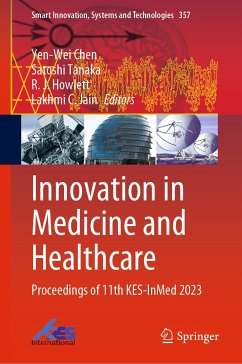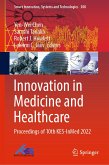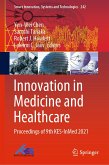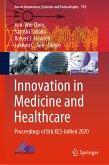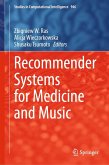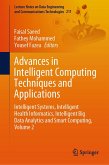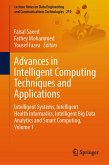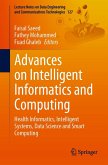Innovation in Medicine and Healthcare (eBook, PDF)
Proceedings of 11th KES-InMed 2023
Redaktion: Chen, Yen-Wei; Jain, Lakhmi C.; Howlett, R. J.; Tanaka, Satoshi
202,95 €
202,95 €
inkl. MwSt.
Sofort per Download lieferbar

101 °P sammeln
202,95 €
Als Download kaufen

202,95 €
inkl. MwSt.
Sofort per Download lieferbar

101 °P sammeln
Jetzt verschenken
Alle Infos zum eBook verschenken
202,95 €
inkl. MwSt.
Sofort per Download lieferbar
Alle Infos zum eBook verschenken

101 °P sammeln
Innovation in Medicine and Healthcare (eBook, PDF)
Proceedings of 11th KES-InMed 2023
Redaktion: Chen, Yen-Wei; Jain, Lakhmi C.; Howlett, R. J.; Tanaka, Satoshi
- Format: PDF
- Merkliste
- Auf die Merkliste
- Bewerten Bewerten
- Teilen
- Produkt teilen
- Produkterinnerung
- Produkterinnerung

Bitte loggen Sie sich zunächst in Ihr Kundenkonto ein oder registrieren Sie sich bei
bücher.de, um das eBook-Abo tolino select nutzen zu können.
Hier können Sie sich einloggen
Hier können Sie sich einloggen
Sie sind bereits eingeloggt. Klicken Sie auf 2. tolino select Abo, um fortzufahren.

Bitte loggen Sie sich zunächst in Ihr Kundenkonto ein oder registrieren Sie sich bei bücher.de, um das eBook-Abo tolino select nutzen zu können.
This book presents the proceedings of the KES International Conferences on Innovation in Medicine and Healthcare (KES-InMed-23), held in Rome, Italy, on June 14-16, 2023. Covering a number of key areas, including digital IT architecture in healthcare; advanced ICT for medicine and healthcare; biomedical engineering, trends, research and technologies; and healthcare support systems, this book is a valuable resource for researchers, managers, industrialists and anyone wishing to gain an overview of the latest research in these fields.
- Geräte: PC
- ohne Kopierschutz
- eBook Hilfe
- Größe: 36.79MB
Andere Kunden interessierten sich auch für
![Innovation in Medicine and Healthcare (eBook, PDF) Innovation in Medicine and Healthcare (eBook, PDF)]() Innovation in Medicine and Healthcare (eBook, PDF)193,95 €
Innovation in Medicine and Healthcare (eBook, PDF)193,95 €![Innovation in Medicine and Healthcare (eBook, PDF) Innovation in Medicine and Healthcare (eBook, PDF)]() Innovation in Medicine and Healthcare (eBook, PDF)161,95 €
Innovation in Medicine and Healthcare (eBook, PDF)161,95 €![Innovation in Medicine and Healthcare (eBook, PDF) Innovation in Medicine and Healthcare (eBook, PDF)]() Innovation in Medicine and Healthcare (eBook, PDF)161,95 €
Innovation in Medicine and Healthcare (eBook, PDF)161,95 €![Recommender Systems for Medicine and Music (eBook, PDF) Recommender Systems for Medicine and Music (eBook, PDF)]() Recommender Systems for Medicine and Music (eBook, PDF)121,95 €
Recommender Systems for Medicine and Music (eBook, PDF)121,95 €![Advances in Intelligent Computing Techniques and Applications (eBook, PDF) Advances in Intelligent Computing Techniques and Applications (eBook, PDF)]() Advances in Intelligent Computing Techniques and Applications (eBook, PDF)145,95 €
Advances in Intelligent Computing Techniques and Applications (eBook, PDF)145,95 €![Advances in Intelligent Computing Techniques and Applications (eBook, PDF) Advances in Intelligent Computing Techniques and Applications (eBook, PDF)]() Advances in Intelligent Computing Techniques and Applications (eBook, PDF)145,95 €
Advances in Intelligent Computing Techniques and Applications (eBook, PDF)145,95 €- -27%11
![Advances on Intelligent Informatics and Computing (eBook, PDF) Advances on Intelligent Informatics and Computing (eBook, PDF)]() Advances on Intelligent Informatics and Computing (eBook, PDF)217,95 €
Advances on Intelligent Informatics and Computing (eBook, PDF)217,95 € -
-
-
This book presents the proceedings of the KES International Conferences on Innovation in Medicine and Healthcare (KES-InMed-23), held in Rome, Italy, on June 14-16, 2023. Covering a number of key areas, including digital IT architecture in healthcare; advanced ICT for medicine and healthcare; biomedical engineering, trends, research and technologies; and healthcare support systems, this book is a valuable resource for researchers, managers, industrialists and anyone wishing to gain an overview of the latest research in these fields.
Dieser Download kann aus rechtlichen Gründen nur mit Rechnungsadresse in A, B, BG, CY, CZ, D, DK, EW, E, FIN, F, GR, HR, H, IRL, I, LT, L, LR, M, NL, PL, P, R, S, SLO, SK ausgeliefert werden.
Produktdetails
- Produktdetails
- Verlag: Springer Nature Singapore
- Seitenzahl: 396
- Erscheinungstermin: 30. Mai 2023
- Englisch
- ISBN-13: 9789819933112
- Artikelnr.: 68150532
- Verlag: Springer Nature Singapore
- Seitenzahl: 396
- Erscheinungstermin: 30. Mai 2023
- Englisch
- ISBN-13: 9789819933112
- Artikelnr.: 68150532
- Herstellerkennzeichnung Die Herstellerinformationen sind derzeit nicht verfügbar.
Prof. Yen-Wei Chen received his B.E. degree in 1985 from Kobe University, Kobe, Japan. He received his M.E. degree in 1987 and his D.E. degree in 1990, both from Osaka University, Osaka, Japan. He was a research fellow at the Institute of Laser Technology, Osaka, from 1991 to 1994. From October 1994 to March 2004, he was an associate professor and a professor at the Department of Electrical and Electronic Engineering, University of the Ryukyus, Okinawa, Japan. He is currently a professor at the College of Information Science and Engineering, Ritsumeikan University, Kyoto, Japan. He is also a visiting professor at the College of Computer Science and Technology, Zhejiang University, Hangzhou, China. He was a visiting scholar at Oxford University, Oxford, UK, in 2003 and at Pennsylvania State University, Pennsylvania, USA, in 2010. His research interests include medical image analysis and computer vision. He has published more than 300 research papers. He has received many distinguished awards including Best Scientific Paper Award of ICPR2013. He is the principal investigator of many projects in biomedical engineering and image analysis, funded by the Japanese Government. Prof. Satoshi Tanaka got his Ph.D. in theoretical physics at Waseda University, Japan, in 1987. After experiencing assistant professors, a senior lecturer, and an associate professor at Waseda University and Fukui University, he became a professor at Ritsumeikan University in 2002. His current research target is computer visualization of complex 3D shapes such as 3D scanned cultural heritage objects, inside structures of a human body, and fluid simulation results. He was the vice president of Visualization Society of Japan (VSJ), the president of Japan Society for Simulation Technology (JSST), and the president of ASIASIM (Federation of Asia Simulation Societies). Currently, he works as a cooperation member of Japan Science Council. He receivedbest paper awards at Asia Simulation Conference (2012 and 2022), Journal of Advanced Simulation in Science and Engineering in 2014, and many others. Robert Howlett is the Academic Chair of KES International a non-profit organisation which facilitates knowledge transfer and the dissemination of research results in areas including Intelligent Systems, Sustainability, and Knowledge Transfer. He is Visiting Professor at 'Aurel Vlaicu' University of Arad, Romania, and has also been Visiting Professor at Bournemouth University, UK. His technical expertise is in the use of artificial intelligence and machine learning for the solution of industrial problems. His current interests centre on the application of intelligent systems to sustainability, particularly renewable energy, smart / micro grids and applications in housing and glasshouse horticulture. He previously developed a national profile in knowledge and technology transfer, and the commercialisation of research. He works with a number of universities and international research groups on the supervision teams of PhD students, and the provision of technical support for projects. Professor Lakhmi C. Jain, PhD, Dr H.C., ME, BE(Hons), Fellow (Engineers Australia), is with the University of Arad. He was formerly with the University of Technology Sydney, the University of Canberra and Bournemouth University. Professor Jain founded the KES International for providing a professional community the opportunities for publications, knowledge exchange, cooperation and teaming. Involving around 5,000 researchers drawn from universities and companies world-wide, KES facilitates international cooperation and generate synergy in teaching and research. KES regularly provides networking opportunities for professional community through one of the largest conferences of its kind in the area of KES. His interests focus on the artificial intelligence paradigms and their applications in complex systems, security, e-education, e-healthcare, unmanned air vehicles and intelligent agents.
Designing deep learning architectures with neuroevolution. Study case: fetal morphology scan.- Optimized Deployment Planning for Elderly Welfare Facilities Based on Network Theory ~A Case Study of Ibaraki Prefecture's Day Care Welfare Facilities for the Elderly.- Online Parent Counselling in Speech and Language Therapy - the View of the Professionals.- Modelling Competing Risk for Stroke Survival Data.- Artificial Intelligence Chatbots and Conversational Agents - an Overview of Clinical Studies in Health Care.- Challenges and Solutions for Artificial Intelligence Adoption in Healthcare - A Literature Review.- An Explainable Deep Network Framework with Case-based Reasoning Strategies for Survival Analysis in Oncology.- Healthcare under Society 5.0: A Systematic Literature Review of Applications and Case Studies.- Strategic Risk Management for Low-Code Development Platforms with Enterprise Architecture Approach: Case of Global Pharmaceutical Enterprise.- Optimized Deployment Planning forElderly Welfare Facilities based on Network Theory ~A Case Study of Ibaraki Prefecture's Day Care Welfare Facilities for the Elderly.- Characterizing Groups of Patients with Depression using Clustering Techniques.
Designing deep learning architectures with neuroevolution. Study case: fetal morphology scan.- Optimized Deployment Planning for Elderly Welfare Facilities Based on Network Theory ~A Case Study of Ibaraki Prefecture's Day Care Welfare Facilities for the Elderly.- Online Parent Counselling in Speech and Language Therapy - the View of the Professionals.- Modelling Competing Risk for Stroke Survival Data.- Artificial Intelligence Chatbots and Conversational Agents - an Overview of Clinical Studies in Health Care.- Challenges and Solutions for Artificial Intelligence Adoption in Healthcare - A Literature Review.- An Explainable Deep Network Framework with Case-based Reasoning Strategies for Survival Analysis in Oncology.- Healthcare under Society 5.0: A Systematic Literature Review of Applications and Case Studies.- Strategic Risk Management for Low-Code Development Platforms with Enterprise Architecture Approach: Case of Global Pharmaceutical Enterprise.- Optimized Deployment Planning forElderly Welfare Facilities based on Network Theory ~A Case Study of Ibaraki Prefecture's Day Care Welfare Facilities for the Elderly.- Characterizing Groups of Patients with Depression using Clustering Techniques.
